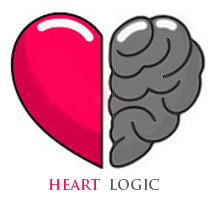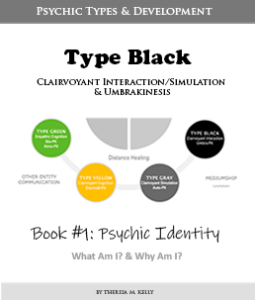- Why Am I? (Type Black)
- Personality Type 1 (Type Black)
- Personality Type #2 (Type Black)
- Attention & Psychic Experiences (Type Black)
- Your Needs & Clairvoyant Interaction/Simulation (Type Black)
- Events and Psychic Experiences (Type Black)
- Personality Changes & Psychic Experiences (Type Black)
- Your Environment & Psychic Experiences (Type Black)
- Age & Psychic Experiences (Type Black)
- Psychic Awareness (Type Black)
- Psychic Illusions (Type Black)
- Belief, Meaning, & Auto Labeling (Type Black)
- Self-fulfilling Prophecies & Ignoring When You’re Wrong (Type Black)
- Probability & Reason (Type Black)
- Don’t Be Fooled (Type Black)
- Seeing Faces & Hearing Your Name (Type Black)
- Precognition vs. Probability Shifting (Type Black)
- Accuracy, OBEs, & Evil Presence (Type Black)
- Weird Does Not Equal Psychic (Type Black)
- Confusing Negative & Positive Experiences (Type Black)
- Externalizing (Type Black)
- Ignoring Negative Psychic Experiences (Type Black)
- Avoid Shortcuts (Type Black)
- Psychic Protections (Type Black)
- #1st List of Psychic Protections (Type Black)
- #2nd List of Psychic Protections (Type Black)
- #3rd List of Psychic Protections (Type Black)
- Psychic Illusions Mini-Quiz – Are You Being Fooled? (Type Black)
- Mini-Quiz: Prone to Psychic Experiences? Ready to Enhance? (Type Black)
- Mini-Quiz: Anxious? Depressed? (Type Black)
PERSONALITY TYPE #2
What about the second set of traits?
OK, first you should know that the second set of traits, which are relatable most towards INFJ’s, make up only 9-14% of the population. Again, this may seem like there are very few people out there like you, but this actually means that using the U.S. population for an example again, there are about 29,538,000 to 45,948,000 out of a population of 328.2 million people just like you. That’s still a lot of people!!
Ok, let’s look at this set of personality traits:
 These Type Blacks are usually highly interested in maintaining order, balance, and harmony in every aspect of their lives.
These Type Blacks are usually highly interested in maintaining order, balance, and harmony in every aspect of their lives.
They are dedicated, detailed, responsible, and quiet individuals who are also friendly and deeply observant of people and their surroundings.
They are incredibly good at remembering fine details, highly respect the feelings of others, and are often described by friends and family as thoughtful and trustworthy.
 They are highly concerned with taking care of those they care for by keeping them safe and secure. These Type Blacks are often humble caretakers who never demand credit or thanks for their hard work and dedication towards caring for others.
They are highly concerned with taking care of those they care for by keeping them safe and secure. These Type Blacks are often humble caretakers who never demand credit or thanks for their hard work and dedication towards caring for others.
However, while they are usually kind and very patient, especially in dealing with the disabled and sick when compared with other types, their shyness with strangers can lead others to see them as being standoffish, distant, or that they think they are better than others.
 It is only among friends and family that this type feels comfortable speaking freely. This type usually has a strong work ethic, take their duties seriously, and are not likely to self-indulge in desires, whims, or addictions.
It is only among friends and family that this type feels comfortable speaking freely. This type usually has a strong work ethic, take their duties seriously, and are not likely to self-indulge in desires, whims, or addictions.
They often believe in being organized and being smart with their money, work very well alone, and while they enjoy taking care of others, they do not enjoy giving orders.
 They often want to believe in the best of people, are highly detailed-orientated and analytical, have a highly clear idea of how things should be, and prefer a practical style towards life, learning, and work.
They often want to believe in the best of people, are highly detailed-orientated and analytical, have a highly clear idea of how things should be, and prefer a practical style towards life, learning, and work.
They enjoy abstract ideas and theories, but such concepts can be a chore for them to learn through the usual learning methods of listening and watching. This is because they prefer a more practical and hands-on style of learning.
 Once they begin a project they will faithfully and tirelessly carry the project through to completion. They have a very well-developed sense of space, function, and aesthetic appeal, and because of this they often live in beautifully furnished, and highly functional homes.
Once they begin a project they will faithfully and tirelessly carry the project through to completion. They have a very well-developed sense of space, function, and aesthetic appeal, and because of this they often live in beautifully furnished, and highly functional homes.
They are highly aware of their own feelings, and if it is negative feelings they are dealing with, this type often lets these feelings build up inside. They do this until these feelings form into firm beliefs against certain people or things., which are hard to change once etched into their minds.
 They have a great deal of difficulty saying “no,” when asked to do something, and because of this, often become over-stressed in many areas of their life.
They have a great deal of difficulty saying “no,” when asked to do something, and because of this, often become over-stressed in many areas of their life.
They often put others before themselves, and because of this they really need to learn how to identify, value, and express their personal limits and needs to others if they ever wish to avoid being over-worked or treated as someone unimportant that will always be there.
 When they have little to no positive feedback like approval, praise, support, and compliments in their life, or lots of criticism, this type can be quick to become DEPRESSED. When depressed or stressed, this type can begin to think very nervously about the many things that could go wrong in their lives.
When they have little to no positive feedback like approval, praise, support, and compliments in their life, or lots of criticism, this type can be quick to become DEPRESSED. When depressed or stressed, this type can begin to think very nervously about the many things that could go wrong in their lives.
They often have strong feelings of insecurity and failure and they can quickly become convinced that “everything is all wrong” or often find themselves repeating the phrase “I can’t do anything right.”
These feelings often stem from low self-confidence and issues with identity where they often ask themselves:
“Who am I, really?” and “Am I really worth having around?”
 It is the fluid nature of their identity that allows for automatism and mediumship experiences to work, to allow other identities (spirits) to have space in their consciousness to embody and communicate, and it is their lowered self-confidence that often drives them to want to help, protect, and support others, such as those of the spirit world.
It is the fluid nature of their identity that allows for automatism and mediumship experiences to work, to allow other identities (spirits) to have space in their consciousness to embody and communicate, and it is their lowered self-confidence that often drives them to want to help, protect, and support others, such as those of the spirit world.
So, while these traits are important to their clairvoyant interactive experiences, ALL THINGS IN MODERATION, as too much of a lack of confidence and identity is what leads these types to uncontrolled psychic experiences.
They have a great ability for helping others who cannot help themselves, and while also being highly detailed-oriented, they are often found in careers like social work, nursing or hospice care, forensic science, environmental science/conservation, veterinary medicine, teaching, human resources, special education, and various areas of behind-the-scenes administration and record-keeping.







